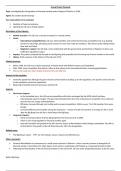Essay
Essay Plan - UK Big Bang - ECON0051 Economics of Regulation
- Institution
- University College London (UCL)
This is an essay plan for a group project that scored 70% - it is a structured plan that is easy to communicate through and adapt to your own project. Full essay available on my profile.
[Show more]




